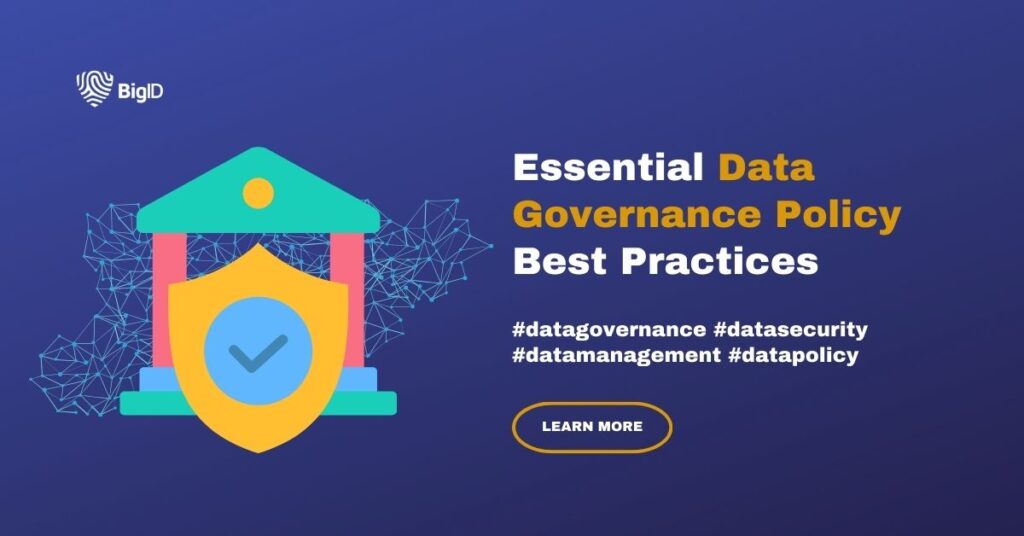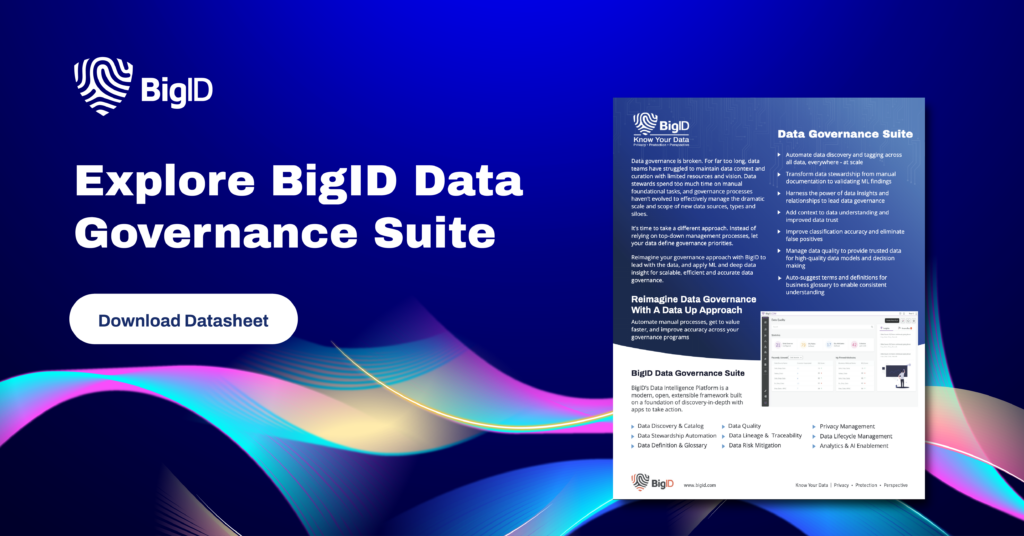Essential Data Governance Policy Best Practices

Alexis serves as Content Marketing Manager for industry leading DSPM provider, BigID. She specializes in helping tech startups craft and hone their voice— to tell more compelling stories that resonate with diverse audiences. She holds a bachelors degree in Professional Writing and a Master’s degree in Marketing Communication from the University of Denver. Alexis is based out of Orlando, FL.
Data Governance

Shaping the Data-Driven Future: The Essential Guide to a Data Governance Policy
In today’s hyper-connected world, data is the lifeblood of organizations, driving decision-making, innovation, and competitive advantage. As the volume, velocity, and variety of data continue to grow exponentially, the need for robust data governance policies has never been more critical. But what exactly is data governance, and why is it so essential?
Understanding Data Governance
Data governance refers to the overarching framework that manages the availability, integrity, usability, and security of data within an organization. This framework encompasses a set of policies, procedures, and standards designed to ensure that data is accurate, consistent, and used responsibly. Effective data governance provides a clear roadmap for managing data assets, from acquisition and storage to usage and disposal.
What is a Data Governance Policy?

A data governance policy is a formal set of guidelines and procedures that an organization implements to ensure the proper management, quality, security, and usage of its data. This policy outlines how data is to be collected, stored, processed, and shared, providing a framework to maintain data integrity, ensure compliance with regulations, and support organizational objectives. Key components of a data governance policy typically include data classification, data handling protocols, roles and responsibilities, data quality standards, security measures, and compliance requirements. The primary goal is to establish a structured approach to managing data as a valuable asset while mitigating risks associated with data misuse or breaches.
The Importance of a Data Governance Policy
- Compliance with Regulations: Ensuring adherence to data protection laws and industry standards.
- Data Quality: Maintaining high standards for data accuracy and consistency.
- Data Security: Protecting sensitive information from unauthorized access and breaches.
- Operational Efficiency: Streamlining data management processes to reduce redundancies and improve decision-making.
- Accountability: Establishing clear roles and responsibilities for data-related activities.
Drivers of Data Governance
Several factors drive the need for data governance:
- Regulatory Requirements: Laws like GDPR, CCPA, and HIPAA impose strict guidelines on data handling, requiring organizations to implement comprehensive data governance frameworks.
- Data Proliferation: The explosion of data from diverse sources necessitates structured management to harness its full potential.
- Technological Advancements: Innovations in AI, machine learning, and big data analytics demand sophisticated governance to ensure ethical and effective use of data.
- Risk Management: Mitigating risks related to data breaches, non-compliance, and poor data quality.
Crafting an Effective Data Governance Policy: 6 Steps
Creating a robust data governance policy is a multifaceted process that requires careful planning, strategic thinking, and ongoing management. Here’s a detailed look at the key steps involved:
1. Assess Current Data Practices
Before implementing new policies, it’s crucial to understand the current state of data management within the organization. This involves:
- Conducting a Data Inventory: Identify and catalog all data assets, including their sources, types, formats, and locations.
- Evaluating Data Quality: Assess the accuracy, completeness, consistency, and reliability of existing data.
- Analyzing Data Flows: Map out how data moves through the organization, from creation and storage to processing and disposal.
- Identifying Gaps: Highlight deficiencies and areas for improvement, such as data silos, inconsistent standards, and security vulnerabilities.
2. Define Clear Objectives
Establishing clear, measurable objectives is essential for guiding the development of data governance policies. Objectives should align with the organization’s strategic goals and might include:
- Ensuring Regulatory Compliance: Adhering to data protection laws and industry-specific regulations.
- Improving Data Quality: Enhancing the accuracy and reliability of data used for decision-making.
- Protecting Data Security: Safeguarding sensitive information from breaches and unauthorized access.
- Enhancing Data Accessibility: Ensuring that relevant data is readily available to authorized users.
- Facilitating Innovation: Enabling the use of data for new product development and business insights.
3. Develop Policies and Standards
With objectives in place, the next step is to develop detailed policies and standards that will govern data handling. Key considerations include:
- Data Classification: Establishing categories for different types of data (e.g., confidential, public, internal) and defining handling procedures for each category.
- Data Handling Procedures: Outlining protocols for data collection, storage, processing, sharing, and disposal.
- Security Measures: Implementing safeguards to protect data, including encryption, access controls, and incident response plans.
- Compliance Requirements: Ensuring policies align with legal and regulatory standards.
- Data Quality Standards: Defining criteria for data accuracy, completeness, and consistency.
4. Assign Roles and Responsibilities
Effective data governance requires clear accountability. This involves:
- Designating Data Stewards: Appointing individuals responsible for managing and ensuring the quality of specific data assets.
- Forming Governance Committees: Creating cross-functional teams to oversee policy development, implementation, and compliance.
- Defining Accountability: Establishing clear roles for data owners, stewards, IT personnel, and compliance officers.
5. Implement Technology Solutions
Leveraging technology is crucial for enforcing data governance policies efficiently. This can include:
- Data Management Tools: Utilizing software for data cataloging, lineage tracking, quality monitoring, and metadata management.
- Automation: Implementing AI and machine learning to automate routine tasks such as data classification, anomaly detection, and compliance checks.
- Security Solutions: Deploying advanced security technologies like firewalls, encryption, and identity management systems to protect data.
6. Monitor and Audit
Continuous monitoring and regular audits are essential to ensure the effectiveness of data governance policies. This involves:
- Monitoring Data Practices: Using analytics and reporting tools to track data usage, quality, and compliance in real-time.
- Conducting Regular Audits: Periodically reviewing data governance processes and policies to identify and address any issues or non-compliance.
- Feedback and Improvement: Collecting feedback from stakeholders and continuously refining policies to adapt to evolving data needs and regulatory requirements.
Data Governance Policy Process: Who Are the Stakeholders?
Effective data governance is a collaborative effort that requires the active participation of multiple stakeholders. Each group plays a crucial role, and their collaboration ensures comprehensive and effective policies. Here’s how these stakeholders work together:
Data Owners
Role: Data owners are individuals or teams responsible for specific data assets within the organization. They understand the business context of the data, including its source, usage, and value.
Collaboration:
- With Data Stewards: Data owners work closely with data stewards to define the business rules and standards for data quality and usage. For example, a marketing team (data owners) might collaborate with a data steward to ensure customer data is accurately captured and consistently formatted across all campaigns.
- With IT and Security Teams: They provide input on access requirements and usage patterns, helping IT teams design appropriate security measures and data access protocols.
Data Stewards
Role: Data stewards are the custodians of data who ensure its integrity, quality, and compliance with established policies.
Collaboration:
- With Data Owners: They translate business requirements into data management practices. For instance, a data steward might work with the finance department to establish protocols for financial data validation and reconciliation.
- With IT and Security Teams: Data stewards ensure that data governance tools and technologies align with the defined policies. They might help in setting up data quality monitoring systems and resolving data issues as they arise.
IT and Security Teams
Role: IT and security teams implement the technical solutions required for data governance and safeguard the organization’s data infrastructure.
Collaboration:
- With Data Stewards and Owners: IT teams design and deploy data management systems based on the requirements provided by data stewards and owners. For example, they might develop a data warehouse that integrates multiple data sources, ensuring data consistency and availability.
- With Compliance Officers: They implement security controls and monitoring systems to ensure data protection and compliance with regulations. For instance, they might deploy encryption technologies to secure sensitive data and ensure audit trails are maintained.
Compliance Officers
Role: Compliance officers ensure that the organization adheres to legal and regulatory requirements related to data governance.
Collaboration:
- With Data Owners and Stewards: They provide guidelines on regulatory requirements and help interpret how these regulations impact data handling practices. For instance, they might work with HR to ensure employee data is managed in compliance with GDPR or other relevant laws.
- With IT and Security Teams: Compliance officers work with IT teams to implement necessary controls and reporting mechanisms. They might oversee the implementation of data access controls and regular compliance audits.
Executive Leadership
Role: Executive leadership provides strategic direction and allocates resources for data governance initiatives. They champion data governance at the highest level and ensure alignment with the organization’s goals.
Collaboration:

- With All Stakeholders: Executives facilitate collaboration among all stakeholders by setting priorities, providing necessary resources, and resolving conflicts. They might establish a data governance council that includes representatives from different departments to oversee policy development and implementation.
- With Data Owners and Stewards: Executives ensure that data governance initiatives are aligned with business objectives. For instance, they might support the implementation of a customer data platform to enhance marketing efforts and customer engagement.
- With Compliance Officers: They ensure that compliance requirements are met by providing the necessary support for compliance initiatives and integrating compliance into the organization’s strategic planning.
Example of a Collaborative Data Governance Policy
Consider a healthcare organization implementing a new patient data management system:
- Data Owners: The healthcare providers (doctors, nurses) define what data needs to be collected and how it should be used to improve patient care.
- Data Stewards: Data stewards ensure that patient data is accurate, complete, and complies with healthcare regulations.
- IT and Security Teams: IT teams develop the system infrastructure, ensuring it integrates with existing systems and protects patient data through robust security measures.
- Compliance Officers: They ensure that the system complies with HIPAA and other relevant regulations, conducting regular audits and providing guidance on data handling practices.
- Executive Leadership: Executives allocate funding for the project, prioritize it within the organization’s strategic plan, and ensure all departments cooperate effectively.
Artificial Intelligence (AI) and Data Governance
The rise of artificial intelligence has profoundly impacted data governance. AI-driven systems rely heavily on vast datasets, making data quality and integrity more critical than ever. Moreover, AI introduces new ethical and regulatory challenges, such as ensuring algorithmic transparency and preventing bias. Consequently, data governance policies must evolve to address these complexities, incorporating guidelines for AI data usage and ethical considerations.
The Future of Data Governance
Looking ahead, data governance will continue to evolve in response to emerging technologies, regulatory changes, and growing data volumes. Key trends shaping the future of data governance include:
- Increased Automation: Leveraging AI and machine learning to automate data governance tasks, such as data classification and anomaly detection.
- Enhanced Data Privacy: Implementing advanced privacy-preserving technologies like differential privacy and homomorphic encryption.
- Global Harmonization: Aligning data governance frameworks with international standards to facilitate cross-border data flows and compliance.
- Data as an Asset: Recognizing data as a strategic asset, leading to more sophisticated data valuation and monetization strategies.
Streamline Your Data Governance Policy with BigID
BigID is the industry leading provider for data privacy, security, and AI data management utilizing deep data discovery and advanced AI for total visibility and control over all your enterprise data at scale.
With BigID organizations can:
- Know Your Data: The ability to identify your data is the first critical step for any data governance framework. In order to reduce risk, organizations need to identify all their data, everywhere. BigID’s data discovery and classification helps organizations automatically identify their sensitive, personal, and regulated data across the entire data landscape.
- Data Classification: Classify all data, everywhere in order to meet compliance for data privacy and data protection. Classify by category, type, sensitivity, policy, and more with BigID’s advanced data classification capabilities.
- Reduce Risk: Manage access to sensitive and critical business data – organizations need to incorporate access control to identify who has (and who should have) access to sensitive data. BigID’s Access Intelligence App helps organizations identify and remediate high-risk data access issues with ML-based insight to identify and prioritize file access risk.
- Incident Response: When incidents happen, every second counts. BigID’s identity- aware breach analysis effectively assesses the scope and magnitude of a data breach. Quickly determine which users and personal data have been compromised and respond.
Effective data governance is within your grasp— book a 1:1 demo with our experts to see how BigID can help implement the right data governance policy for your organization today.





